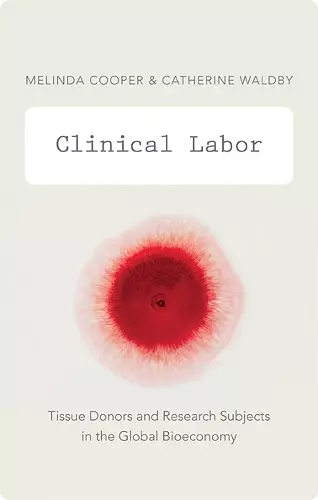Clinical Labor
Tissue Donors and Research Subjects in the Global Bioeconomy
Catherine Waldby author Melinda Cooper author
Format:Paperback
Publisher:Duke University Press
Published:14th Feb '14
Currently unavailable, and unfortunately no date known when it will be back

Forms of embodied labor, such as surrogacy and participation in clinical trials, are central to biomedical innovation, but they are rarely considered as labor. Melinda Cooper and Catherine Waldby take on that project, analyzing what they call "clinical labor," and asking what such an analysis might indicate about the organization of the bioeconomy and the broader organization of labor and value today. At the same time, they reflect on the challenges that clinical labor might pose to some of the founding assumptions of classical, Marxist, and post-Fordist theories of labor.
Cooper and Waldby examine the rapidly expanding transnational labor markets surrounding assisted reproduction and experimental drug trials. As they discuss, the pharmaceutical industry demands ever greater numbers of trial subjects to meet its innovation imperatives. The assisted reproductive market grows as more and more households look to third-party providers for fertility services and sectors of the biomedical industry seek reproductive tissues rich in stem cells. Cooper and Waldby trace the historical conditions, political economy, and contemporary trajectory of clinical labor. Ultimately, they reveal clinical labor to be emblematic of labor in twenty-first-century neoliberal economies.
“In the literature on contributors to medical knowledge, attention is most often focused on basic and applied researchers, funders, and regulators. In Clinical Labor, Cooper and Waldby focus on an essential, overlooked, and perhaps exploited population, that of research subjects. The authors are at their strongest in applying a Marxist theoretical perspective to class in medical research and the need to conceptualize participation in clinical trials as labor. . . . Recommended. Graduate students, researchers/faculty, and professionals/practitioners.” -- M. D. Lagerwey * Choice *
"Poised to be not only a classic analysis of the bioeconomy, but the strongest exemplar of a style of analysis of which we urgently need more." -- Aaron Panofsky * Social Forces *
"Melinda Cooper and Catherine Waldby's Clinical Labor: Tissue Donors and Research Subjects in the Global Bioeconomy offers a highly original, gendered analysis of expansive and emergent labor forms "hidden in plain sight" in the rapidly proliferating bioeconomy.... Clinical Labor provides a forceful instance of Marxist–feminist theory, focusing on the next stage of capital accumulation, worker consciousness, and potential opposition." -- Rayna Rapp * Bulletin of the History of Medicine *
"In scholarship on the contemporary role and practices of the biosciences in the production of knowledge, value, and life itself,Clinical Labor stands out as an important contribution that helps make sense of new incorporations of bodies, stratifications, and relation.... Clinical Labor is sweeping and comprehensive, fluidly showing how legal concepts and economic practices interweave with biomedical production and bioethics." -- Janet K. Shim * American Journal of Sociology *
"Overall, Clinical Labor is a compelling and thought-provoking book. It provides an excellent overview of political bioeconomy and brings up a broad range of intriguing questions for readers interested in biomedical economies or Marxist thought." -- Heather Edelblute * ISIS *
"Cooper and Waldby expertly offer a comprehensive and substantial argument for why a reconceptualization of human subject experimentation as clinical labor is necessary by outlining inadequacies and challenges within existing regulation. This book is a provocative read suitable for scholars in multiple fields of the social sciences." -- Por Heong Hong * East Asian Science, Technology and Society *
ISBN: 9780822356226
Dimensions: unknown
Weight: 431g
296 pages